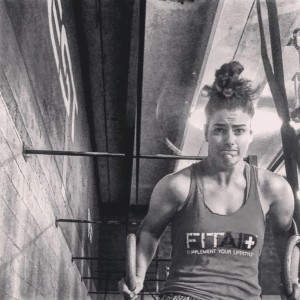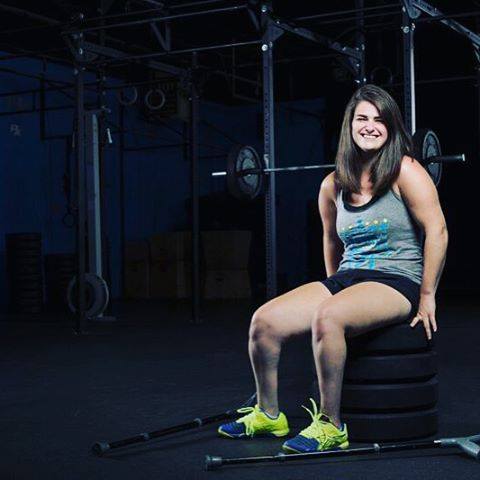Steph Hammerman knew her journey to obtain her L2 Certificate to coach CrossFit wouldn’t look the same as most people’s.
Hammerman, known affectionately as “The Hammer” in the CrossFit world, was diagnosed with cerebral palsy at two weeks old.
“Simply put, I’ve lived with it my whole life,” the New York native said. “I have a very mild case of spastic CP, which mainly affects my legs as well as some motor skills. I use a wheelchair and crutches to get around.”
Now 25, Hammerman discovered the world of CrossFit in her attempts to become a better cyclist. She’s never been in the habit of letting her diagnosis keep her from being active — she grew up swimming and riding horses — but said she really started feeling a competitive drive after completing her first marathon in 2011. Little did she know that her dip into the CrossFit world would evolve into her becoming the first woman with cerebral palsy to become an L2-certified coach.
“CrossFit was different because it wasn’t something that seemed to fit into any mold,” she said. “I knew people might think I was crazy for trying it, but at the end of the day I’m so glad I did.”
Hammerman said her journey into CrossFit was a bit like establishing a new relationship. She knew she enjoyed it, but never expected to fall so deeply in love with the sport.
“The grand sense of community is probably the most attractive thing about the sport,” she said. “I have never seen in any other athletic events the kind of respect that each athlete has for each other no matter their fitness level, and I think that’s what makes the experience so unique.”
Hammerman said that she experienced challenges and struggles when she first began, as does any athlete starting a new sport.
“When I first started, everything seemed hard, but I was determined to make it work,” she said. “As time went on, I started getting more comfortable with the movements and my scales started to come to me with more ease. Every day that you step foot in the box and the clock begins to count down, I think every athlete encounters the mental side of CrossFit and although at the time (the WOD) may seem like something that may not be able to be done, at the end you can truly surprise yourself.”
Hammerman made the decision to pursue coaching after David “Chef” Wallach of CrossFit Rubicon in Virginia offered her an internship in Summer 2013.
“If I were being honest, to say I struggled would be an understatement,” she said. “I wanted to be good so badly that I wasn’t allowing myself to learn from the mistakes I was making. As time went on, I got out of my own way and allowed myself to understand that being perfect wasn’t the goal. The goal was to learn, grow and help others achieve goals they never once thought they could.
 People had this idea of the mold that I was supposed to fill and when I became a coach, I cracked that mold forever.”
People had this idea of the mold that I was supposed to fill and when I became a coach, I cracked that mold forever.”At the end of the day, Hammerman said her main goal is to help other adaptive athletes achieve their fitness goals.
“Holding the title of ‘world’s first’ anything is a pretty cool accomplishment, but just because I was the first doesn’t mean I want to be the world’s only,” she said. “I put content out in hopes of making the road easier for other adaptive athletes in my position. If I can help change one life, I will know I have done my job. I like to think that CP comes with the innate ability to see the world differently. As I have gotten older, I have learned to embrace that side of my life and I think that’s why I love coaching so much. Living with CP is something I will never be able to change so, why not do my best to change people’s perception of what a typical coach should look like?”
She said her fitness and nutrition routine includes working out five to six times in a week and maintaining a balanced diet. When it comes to picking a favorite or least favorite movement, Hammerman said they’re all important.
“I think all these movements are so important to enhancing people’s lives functionally,” she said. “Many athletes grunt at the idea of running or doing burpees, but I look at these movements as essential keys to a better future. Getting from place to place and being able to pick yourself up independently are such gratifying feelings, so I do my best to work on that daily because I never want that door to lock on me.”
Although Hammerman definitely feels that her cerebral palsy has allowed for her to see things differently, she says that it doesn’t really affect her coaching.
“I don’t think there’s that much that’s unique other than the fact that I sit down while I coach and have to use many more colorful verbal cues to create images that my athletes can connect to and remember,” she said. “I have worked very hard and I feel extremely fortunate to know and understand the sport in two different ways. It gives me the ability to impact a wider variety of people.”
In the future, Hammerman said she sees herself obtaining her Level 3 certification and possibly opening her own affiliate.
“This sport has revived my sense of purpose and at the end of the day, all I want to do is give back to to others exactly what this sport gave me.”
And her best advice for her athletes?
“Listen to yourself and take a chance,” she said. “It may seem intimidating to start, but once you do you will never look back. I have always believed that fitness is for anyone of any ability — you just have to want it bad enough. Once you do, your life will never be the same.”


